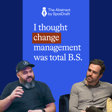
Privacy, Ad Tech, and AI: Julia Shullman, GC and Chief Privacy Officer, Telly
New technologies are advancing faster than ever. How can we rely on our experience to solve unforeseen privacy issues as our personal data makes its way to places we never imagined it could end up?
Julia Shullman, Telly’s GC and Chief Privacy Officer, has spent nearly two decades advocating for privacy in the complex ecosystem of advertising technology. She has learned that one of the most important things a Chief Privacy Officer can do is acknowledge what they don’t know and rely on the expertise of other teams to build smart products that protect user data.
Join Julia as she reveals her thoughts on where these essential consumer safeguards are headed as we enter into an era of AI and business-first thinking.
Read detailed summary: https://www.spotdraft.com/podcast/episode-16
Topics:
Introduction: 0:18
Blending hardware, software, and privacy at Telly: 1:00
Finding your way from M&A to privacy law: 4:16
Transitioning into ad tech at AppNexus: 6:37
Identifying the necessary attitude to be successful in privacy: 10:42
Overseeing the transformation from AppNexus to Xandr at AT&T: 13:10
Taking on a GC role at TripleLift: 15:45
Building trust with executive team and partners at Vista Equity Partners: 22:07
Stepping away to found a privacy and policy consulting firm: 25:57
Advice to lawyers searching for their next GC role: 32:12
Considering the future of the chief privacy officer role: 33:24
Speculating on the future of privacy and AI: 36:17
Book recommendations: 41:34
Connect with us:
Julia Shullman: https://www.linkedin.com/in/julia-shullman/
Tyler Finn - https://www.linkedin.com/in/tylerhfinn
SpotDraft - https://www.linkedin.com/company/spotdraft
SpotDraft is a leading CLM platform that solves your end-to-end contract management issues. Visit https://www.spotdraft.com to learn more.



















